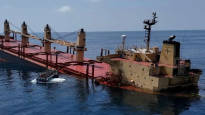The decision to send officers will be made in the next few days.
In the next few days, Finland will decide on its participation in securing cargo ships in the Red Sea.
According to ‘s sources, Finland is planning to send soldiers to secure shipping. The Ministry of Defense and the Ministry of Foreign Affairs have prepared the matter in a busy schedule. It is one of the first solutions that the new president Alexander Stubb gets on the table.
Probably a few staff officers would be sent to the operation to plan and lead. The number would be less than ten soldiers.
Sweden previously announced that it would send its own soldiers to the region. The Swedish Defense Forces announced at the beginning of the week that four officers are already at the EU mission’s headquarters in Greece or on the ship. At most, Sweden will send ten soldiers.
Denmark already decided in December to send a frigate to the region for the US-led operation.
According to ‘s information, Finland has not yet decided which operations the Finns will participate in. Under consideration are US and EU operations, where soldiers from different countries create a situational picture and secure shipping traffic.
Western countries try to secure shipping in the Red Sea with many different operations:
Tensions in the region increased when Hamas carried out a terrorist attack on Israel in October and Israel started a war in Gaza. After that, Yemen’s rebel Houthis began disrupting the area’s busy shipping traffic and attacking ships.
The Houthis are an Iranian-backed rebel group that opposes the Yemeni government.
According to the United States Defense Administration, 10-15 percent of the world’s ships pass through the Red Sea.
Since the attacks began, ships have avoided the area and taken slow and expensive detours. Consumers pay the increased cost of freight in the price of the products.
According to the Kiel Institute, ship traffic in the area was only 20 percent of what was predicted in January.
Upin Alaranta: A typical dilemma when something needs to be done
Finland is under pressure to participate in international missions, both as a member of the EU and as a new NATO country. In the past, it has been speculated that Finland cannot find a suitable platform for the tasks. That’s why they sent a few officers to the spot.
As an EU country, Finland has often participated in operations precisely by sending a small number of officers.
– Finland often follows a general line in the EU. As far as the United States is concerned, we are happy to appear active and put our cards in the pile, says a senior researcher at the Foreign Policy Institute Toni Alaranta.
It is not easy to assess the effects of securing shipping and striking rebel targets. Alaranta reminds that the United States justified its first strikes with the damming effect. On the other hand, the country contradictorily stated that this will also escalate the situation.
– This is a typical dilemma situation. Something needs to be done, and then we do it.
In Alaranta’s opinion, the most useful thing from Finland and other allies would be a message to the United States that it would put pressure on Israel for peace. It would also affect the Red Sea, because the Houthis justify their ship strikes with the Gaza war.
You can discuss the topic until 23:00 on March 6, 2024
